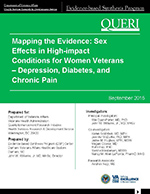
Principal Investigators:
Wei Duan-Porter, MD, PhD;
John W. Williams, Jr., MD, MHSc
Co-investigators:
Karen Goldstein, MD, MPH;
Jennifer McDuffie, PhD, MPH;
Jaime M. Hughes, MPH, MSW;
Megan Clowse, MD;
Ruth Klap, PhD;
Varsha Masilamani, MBBS;
Nancy M. Allen LaPointe, PharmD, MHS;
Research Associate:
Avishek Nagi, MS
Download PDF: Complete Report, Abstract, Report, Appendices
Women are entering the military at unprecedented rates and comprise a rapidly increasing segment of Veterans Health Administration (VHA) enrollees. In response, the VHA Women’s Health Service requested an evidence map to (1) identify effective interventions in women, (2) better understand sex differences in intervention effects for high-impact medical conditions, and (3) identify gaps in evidence about the efficacy of interventions in women.
Consistent with the general principles of evidence mapping, our goal was to provide high-level information about broad questions rather than detailed information on a narrow set of questions. We used a stakeholder-driven approach to identify high-priority conditions and interventions. Given the diversity of interventions and range of prioritized conditions, we focused on systematic reviews in order to best estimate the volume of research and treatment effects. Systematic reviews follow a structured approach to identifying relevant studies and summarize the results, often using quantitative estimates (ie, meta-analyses) to generate pooled effect estimates. For treatment efficacy, we prioritized results from systematic reviews that exclusively used randomized trials for effect estimates. However, we did not conduct a quality assessment of these studies, and estimates of treatment effect should be interpreted cautiously. For adverse effects, we also closely examined systematic reviews that included observational studies. We piloted our methodology in an evidence map of a set of diverse interventions for depressive disorders and presented these results to key stakeholders. We then refined our methods and applied the updated protocols to the remaining conditions of interest.
Mapping the Evidence: Sex and Gender Differences in Treatments for Depression, Diabetes, and Chronic Pain (Cyberseminar)
Duan-Porter W, Goldstein K, McDuffie J, et al. Reporting of Sex Effects by Systematic Reviews on Interventions for Depression, Diabetes, and Chronic Pain. Annals of Internal Medicine. Published online first on 26 April 2016. doi: 10.7326/M15-2877.
Gender Differences in Intervention Effects for High-Impact Conditions among Women Veterans (Management eBrief)